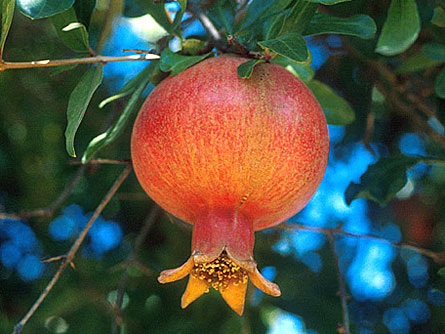Herbal supplementation can be an empty gesture
Some of us skip breakfast to grab a few more zzzzzz’s or forego lunch while running errands. When the hunger siren goes off, all too often we reach for a snack — sometimes even the ones poured into a glass and served up with a straw. Vitamins, mineral capsules and other dietary supplements can fortify the body with nutrients that don’t always make it into busy lives fueled by not-so-balanced diets.

But how do we know what’s in those supplements? That was the topic of a Science News cover story six years ago. And the simple answer then, as now: We don’t. This can be especially true for supplements that aren’t compounded from discrete, well-defined chemicals, such as alpha-tocopherol or magnesium citrate.
As a new paper once again demonstrates, what is marketed as a botanical extract can be — and all too often is — quite variable. In some cases, it may be worthless.
David Heber’s team at UCLA’s David Geffen School of Medicine focused on pomegranates.
In animal studies, consumption of this fruit, and especially its juice, has been linked with slowing the development of atherosclerosis. In one three-year Israeli study conducted in volunteers with atherosclerosis, people who drank 50 milliliters of pomegranate juice daily experienced a 20 percent drop in systolic blood pressure and a beneficial reduction in the thickness of their carotid artery walls. Moreover, oxidation of their “bad” cholesterol (the low-density-lipoprotein type) — which is a pivotal step in fostering artery-clogging plaque — dropped dramatically. Those who had been drinking a placebo beverage attained no such heart benefits.
But pomegranates tend to be a very seasonal fruit, at least in North America. And their juice is not only very tart but pricey. Much nicer — and less expensive — would be pills that delivered pomegranate’s benefits. And so the pom supplement industry was born.
For its new study, Heber’s team bought 27 different pom supplements: a mix of capsules, tablets and soft gels.
Since oxidation plays a pivotal role in atherosclerosis, the UCLA group focused on quantifying the key antioxidants present in pomegranate juice: a trio of water-soluble tannins known as punicalin and punicalagins A and B. Too big to be absorbed by the body, these tannins will break down in the gut into ellagic acid, which is absorbed. It, in turn, breaks down into agents known as urolithins. These are suspected of accounting for some of pomegranate’s health benefits, the researchers note.
In general, chemical analyses have tended to correlate pomegranate’s health benefits to the presence of polyphenols with antioxidant and anti-inflammatory properties. Chief among such polyphenols are the fruit’s tannins.
Manufacturers point to ellagic acid as a marker of the quantity of pomegranate tannins that have made it into their supplements. But herein lies a problem, Heber’s team found. A big problem.
Seventeen of the 27 pom supplements had copious ellagic acid (sometimes more than 50 percent of a product’s contents) — but no detectable pomegranate tannins. Another five had no tannins or ellagic acid, the UCLA scientists report in the Aug. 26 Journal of Agricultural and Food Chemistry. Just five supplements — 29 percent of those tested — sported a “typical pomegranate tannin profile” of between 1 and 12 percent ellagic acid, perhaps one percent punicalin and 6 to 18 percent punicalagins.
Some manufacturers may be fortifying their products with ellagic acid derived from cheaper sources, such as chestnut bark, the researchers suggest. Or many supplement makers may “inadvertently” lose beneficial tannins during processing. Whatever the reason, these scientists conclude: Ellagic acid concentrations offer no guarantee of “pomegranate supplement authenticity.” Indeed, one product they tested showed no evidence of pomegranate.
Before you ask: No, the authors did not name the products tested, much less the ones that passed their acid test.
Some other points bear keeping in mind. In most research that has correlated health benefits with consumption of a botanical product — be it pomegranate, mushroom, echinacea or cinnamon — the active ingredients remain unknown. And that can be a problem, since most plants consist of hundreds of discrete compounds whose concentrations vary by season, by cultivation practices, by climate — even by the type and degree of pest predation. And that’s before harvesters employ chemistry-altering storage and food-processing techniques on the plant material.
Unless research has established what components of a plant are needed, in what quantities, and in the company — or absence — of what other compounds, it can be virtually meaningless to extrapolate health impacts from one tested botanical product to another from even the same cultivated variety.
Which could mean steady employment for food chemists throughout the next half-century.







